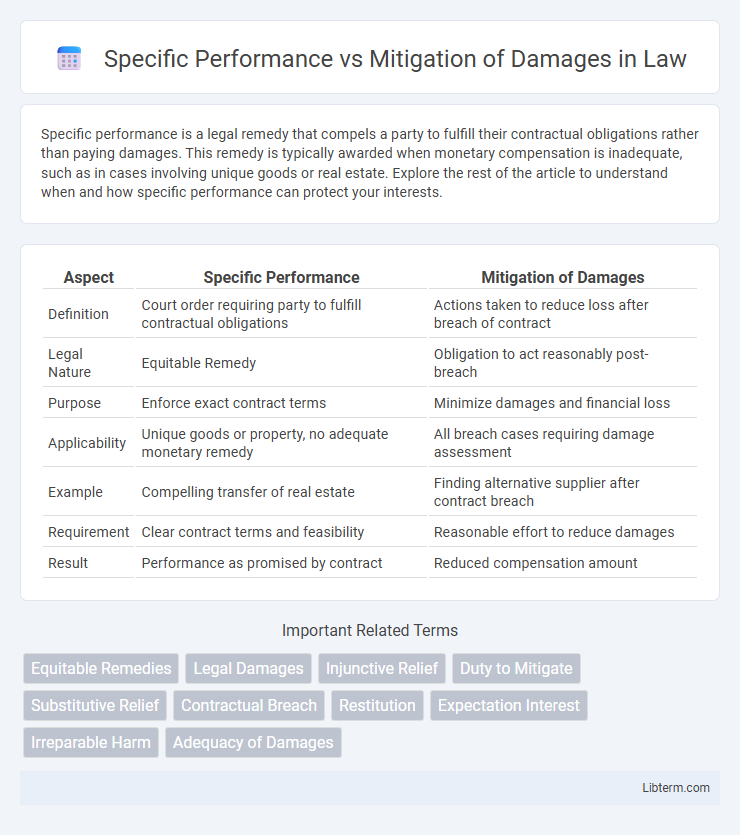Specific performance is a legal remedy that compels a party to fulfill their contractual obligations rather than paying damages. This remedy is typically awarded when monetary compensation is inadequate, such as in cases involving unique goods or real estate. Explore the rest of the article to understand when and how specific performance can protect your interests.
Table of Comparison
| Aspect | Specific Performance | Mitigation of Damages |
|---|---|---|
| Definition | Court order requiring party to fulfill contractual obligations | Actions taken to reduce loss after breach of contract |
| Legal Nature | Equitable Remedy | Obligation to act reasonably post-breach |
| Purpose | Enforce exact contract terms | Minimize damages and financial loss |
| Applicability | Unique goods or property, no adequate monetary remedy | All breach cases requiring damage assessment |
| Example | Compelling transfer of real estate | Finding alternative supplier after contract breach |
| Requirement | Clear contract terms and feasibility | Reasonable effort to reduce damages |
| Result | Performance as promised by contract | Reduced compensation amount |
Introduction to Contract Remedies
Specific performance and mitigation of damages represent two fundamental contract remedies addressing breach consequences. Specific performance compels the breaching party to fulfill contractual obligations, often applied when monetary damages are insufficient, such as in real estate transactions or unique goods contracts. Mitigation of damages requires the non-breaching party to take reasonable steps to reduce incurred losses, ensuring compensation reflects actual harm rather than hypothetical or inflated damages.
Defining Specific Performance
Specific performance is an equitable remedy in contract law that compels a party to fulfill their contractual obligations rather than paying monetary damages. This remedy is typically applied when the subject matter of the contract is unique or where damages are insufficient to remedy the breach, such as in real estate or rare goods transactions. Courts grant specific performance to ensure precise fulfillment of the agreement, emphasizing the enforceability of specific duties over financial compensation.
Understanding Mitigation of Damages
Mitigation of damages requires the non-breaching party to take reasonable steps to reduce the loss resulting from a breach of contract, such as seeking alternative goods or services at a reasonable cost. Courts closely examine whether the injured party acted diligently to minimize their damages before awarding compensation, ensuring that recovery is fair and not excessive. Understanding mitigation is essential, as failure to mitigate can lead to reduced or denied damages, impacting the overall remedy in contract disputes.
Legal Foundations and Principles
Specific performance and mitigation of damages arise from distinct legal foundations: specific performance is an equitable remedy compelling a party to fulfill contractual obligations when monetary damages are inadequate, rooted in principles of fairness and contract sanctity. Mitigation of damages, grounded in common law, requires the non-breaching party to take reasonable steps to minimize loss, reflecting the principle that damages should not be unnecessarily exacerbated. Both doctrines enforce accountability but differ in remedy type--performance enforcement versus damage limitation--shaping contractual dispute resolution strategies.
When Specific Performance Applies
Specific performance applies primarily in contract law when monetary damages are insufficient to remedy the breach, often involving unique goods or real estate transactions. Courts enforce specific performance when the subject matter is rare or irreplaceable, such as land, rare artworks, or custom-made items. This equitable remedy ensures the breaching party fulfills their exact contractual duties, contrasting with mitigation of damages where the non-breaching party must minimize losses through reasonable efforts.
Situations Requiring Mitigation of Damages
Situations requiring mitigation of damages arise when a non-breaching party must take reasonable steps to minimize the financial harm caused by the breaching party's actions. Courts enforce mitigation to prevent the unjust enrichment of the injured party by ensuring they do not recover damages that could have been reasonably avoided. Unlike specific performance, which mandates actual fulfillment of contractual obligations, mitigation emphasizes the injured party's duty to reduce losses through practical and timely measures.
Key Differences Between the Two Remedies
Specific performance compels a party to fulfill contractual obligations exactly as agreed, typically used when monetary damages are insufficient, such as in real estate transactions. Mitigation of damages requires the injured party to take reasonable steps to reduce their losses after a breach, softening the financial impact rather than enforcing contract terms. The key difference lies in specific performance enforcing exact compliance, while mitigation focuses on minimizing harm through reasonable actions post-breach.
Case Law Illustrating Each Remedy
In contract law, specific performance is a remedy compelling a party to fulfill their contractual obligations, exemplified by the landmark case *Lumley v Wagner* where the court ordered a singer to perform exclusively for a specific theater. Mitigation of damages requires the non-breaching party to take reasonable steps to reduce losses, as demonstrated in *British Westinghouse Electric Co Ltd v Underground Electric Railways Co of London Ltd*, where the claimant was expected to minimize the damages after breach. These cases highlight the judiciary's tailored approach in enforcing contracts or limiting damages based on the circumstances.
Choosing the Right Remedy: Factors to Consider
Choosing the right remedy between specific performance and mitigation of damages depends on factors such as the uniqueness of the subject matter and the feasibility of monetary compensation. Specific performance is preferred when the contract involves unique goods or property, making monetary damages inadequate. Mitigation of damages is optimal when the injured party can reduce losses through reasonable efforts and the breach can be remedied financially.
Practical Implications for Contracting Parties
Specific performance enforces the exact fulfillment of contract terms, often used in cases involving unique goods or real estate where monetary damages are inadequate. Mitigation of damages requires the non-breaching party to take reasonable steps to minimize losses, emphasizing proportional compensation over exact compliance. Contracting parties must weigh the enforceability and practicality of specific performance against the cost-effectiveness and procedural demands of damage mitigation strategies.
Specific Performance Infographic

 libterm.com
libterm.com